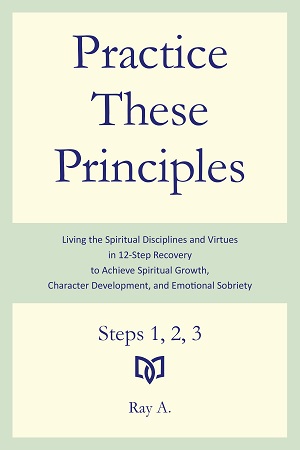
"Looking first at what is meant by a discipline, we find that the term comes from a Latin word from which we get our word disciple, meaning pupil or student, that is, one who follows or adheres to a given set of teachings or course of learning or training. Gaining mastery or excellence in any field of endeavor requires following a particular discipline, a set of methods, exercises or practices peculiar to that field.
Recovery in AA is no different. It too has its own set of disciplines. These disciplines apply to two fundamental aspects of our lives: the spiritual and the moral, that is, our relationship with God and our relationship with others.
In the moral life, a discipline refers to a course of training or a set of practices that aims to promote a specific pattern of behavior and character traits in an individual’s relations with his neighbor. In the spiritual life, a discipline refers to training and practice designed to bring about a specific pattern of behavior and character traits in an individual’s relations with God. The aim is to know God’s will for us, especially as it affects our relations with others, and to receive the grace by which to do it. Because of this, because our relationship with God is the basis for our relationship with neighbor, all the disciplines, including the moral, are rightly considered to be spiritual.
The more familiar word “program” by which we refer to the 12 Steps contains some of the same basic ideas as discipline, primarily the idea of an objectively ordered, methodical, and purposeful sequence of actions aimed at attaining a set of skills necessary to achieve a desired goal. What it lacks is the subjective connotations discipline carries of high motivation, deliberate intention, commitment, diligence, and perseverance.
The disciplines form the backbone of the 12 Steps. In AA these consist of surrender, self-examination, confession, restitution, prayer, meditation, and service, witness and fellowship. All of these are of course ancient religious or spiritual practices, though their names and how they are understood and applied may vary from one tradition to another. We learn in AA history that they come to us through the Judeo-Christian tradition via the Oxford Group, the evangelical movement modeled on first-century Christianity that influenced AA in its formative stages.10
Of these, surrender is the foundational discipline. This is so in two ways. First, it is the core discipline of the first three Steps (often called “the surrender Steps”), which lay the foundation for the other nine. Second, it is the discipline at the root of each of the other disciplines. We will find that, without surrender, no other discipline can be fully practiced, and no Step fully taken. Rebellion blocks our way at every turn. Surrender is the requisite spiritual discipline, the discipline that opens the door to a right relationship with God, which in turn makes a right relationship with neighbor possible. Thus our journey through the Steps and the disciplines is first and foremost a continuing and deepening process of self-surrender.
The first step in surrender is our admission of powerlessness to control our drinking and manage our lives. At first this admission doesn’t rise to the level of a discipline, which is inherently a product of choice. Instead, it is forced on us by circumstance. But as we continue in recovery, our admission of powerlessness begins to transcend our problem with alcohol and applies to all our affairs. It is then that we start to practice surrender as a discipline, and Step 1 becomes at all times and in all situations the first and indispensable step. In Step 2 we continue to yield power and control by surrendering unbelief, which separates us from a Power greater than ourselves who can restore us to sanity. In Step 3 we make a decision to surrender all to God, will and life.
The other disciplines grow out of this process of surrender, and become operational through one or more specific Steps. . . .
In the process of doing so, the Steps gradually become less of a tall order, and in time the disciplines grow into spiritual habits, a progressively natural way of life. We surrender and yield with greater ease and grace. We examine our conscience daily and are quick to admit wrongs and make amends. We seek conscious contact and God’s will consistently, taking to our knees morning and night in prayer and meditation and reconnecting at regular intervals during the course of our day. We give of ourselves and share freely. We engage with others and participate with pleasure in the things that bring us together for the common good."
– From "The Disciplines," pp. 13–14, 17
For more PTP123 Excerpts, please click on link.